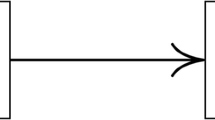Abstract
Present laws and regulations even in democratic countries are not sufficient to prevent the grave environmental threats we face. Further, even environmental ethics, when they remain anthropocentric cannot propose a better approach. I argue that, taking in considerations the precautionary principle, and adopting the perspective of post-normal science, the ethics of integrity suggest a better way to reduce ecological threats and promote the human good globally.
Similar content being viewed by others
References
Ayres, E. (1996), ‘The Expanding Shadow Economy’ World Watch, July/August, 11-23.
Brown, D. (1995), ‘The Role of Law in Sustainable development and Environmental Protection Decisionmaking’ in Sustainable development: Science Ethics and Public Policy, Dordrecht: Kluwer Academic Publishers, 64-76.
Bullard, R. (1994), Dumping in Dixie, (Race Class and Environmental Quality), Boulder Co: Westview Press, Inc.
Cilinskis, E. and Zaloksnis, J. (1996), Ambio, Vol. 25,No. 3, 103-107
Durning, Alan Thein (1996), ‘The Six Floods,’ World Watch, 6, 28-36.
Evan, W., Freeman, E. (1988), ‘A Stakeholder Theory of the Modern Corporation: Kantian Capitalism’, in: Beauchamp T., Bowie N., (eds.), Ethical Theory and Business, 3rd ed., Englewood Cliffs, N.J.: Prentice Hall, 97, 101–105.
Funtowicz, S., Ravetz, Jerome (1995), ‘Science for the Post-Normal Age’ in: Perspectives on Ecological Integrity, Dordrecht: Kluwer Academic Publishers, 146-161.
Golley, Frank, B. (1993), A History of the Ecosystem Concept in Ecology, Yale University Press.
Goodpaster, Kenneth (1991), ‘Business Ethics and Stakeholder Analysis’ Business Ethics Quarterly, 1.
Hagen, Joel N. (1992), An Entangled Bank: The Origins of Ecosystem Ecology, New Brunswick, N.J.: Rutgers University Press, esp.ch.8 ‘Evolutionary Heresies’, 146-163.
Homer-Dixon, Thomas (1991), ‘On The Threshold: Environmental Changes as Causes of Acute Conflict’, International Security, 2, 76-116.
Jamieson, Dale (1990), ‘Managing the Future: Public Policy, Scientific Uncertainty, and Global Warming’, in: Scherer, D. (ed.), Upstream/Downstream. Philadelphia, PA: Temple University Press, 67-89.
Jamieson, Dale (1992), ‘Ethics, Public Policy and Global Warming’, Science, Technology and Human Values, 2, 139-153.
Karr, James R., Angermeier Paul, L. (1994), ‘Protecting Biotic Resources: Biological Integrity versus Biological Diversity as Policy Directives’, Bio Science.
Karr, James, R. (1996), ‘Ecological Integrity and Ecological Health Are Not the Same’ in: Schulzeed P (ed.), Engineering within Ecological Constraints, Washington, D.C.: National Academy Press, 100-113.
Kay, James J., Schneider, E. (1994), ‘The Challenge of the Ecosystem Approach’, Alternatives, 3, 1-6; reprinted in: Westra, L., Lemons, J. (eds.), Perspectives on Integrity, Dordrecht: Kluwer Academic Publishers, 49–59.
Kay, James (1992), ‘A Non-equilibrium Thermodynamic Framework for Discussing Ecosystem Integrity’, Environmental Management, 15:4, 483-495.
Leopold, A. (1949), A Sand County Almanac and Sketches Here and There, New York: Oxford University Press.
Ludwig, D., Hilborn, R., Walters, C. (1993), ‘Uncertainty, Resource Exploitation’, Science, 2, 17-36.
McMichael, Anthony J. (1995), Planetary Overload, Cambridge, U.K.: Cambridge University Press.
McGinn, R. (1944), ‘Technology, Demography, and the Anachronism of Traditional Rights’, Journal of Applied Philosophy 1, 51-70
Myers, Norman (1993), ‘Biodiversity and the Precautionary Principle’, Ambio, 2–3, 74-79.
Norton, Bryan (1995), ‘Why I am not a Nonantropocentrist: Callicott and the Failure of Monistic Inheventism’, Environmental Ethics, 17No 4(Winter0, 341-581
Noss, R. (1995), ‘Maintaining Ecological Integrity in Representative Reserve Networks’, A World Wildlife Fund Canada/World Wildlife Fund/United States Discussion Paper, January.
Noss, Reed, F. (1992), ‘The Wildlands Project: Land Conservation Strategy’, Wild Earth, Special Issue, 10-25.
Noss, Reed, F. and Cooperrider, Alan (1994), Saving Nature's Legacy, Washington D.C.: Island Press.
Partridge, E. (1990), ‘On the Rights of Future Generations’, in: Scherer, D. (ed.), Upstream/Downstream. Philadelphia, PA: Temple University Press, 40-66.
Rees, W.E. and Wackernagel, M. (1996), Our Ecological Footprint, Gabriola Island, B.C.: New Society Publishers.
Rockefeller, Steven C. (1996), ‘Principles of Environmental Conservation Summary and Survey’, Earth Charter, April.
Sagoff, M. (1988), The Economy of the Earth: Philosophy, Law and the Environment, Cambridge, U.K.: Cambridge University Press.
Shrader-Frechtte, K. (1991), Risk and Rationality, Berkeley, CA.: University of California Press.
Shrader-Frechtte, K. (1995a), ‘Hard Ecology, Soft Ecology, and Ecosystem Integrity’, in: Westra L., Lemons John (eds.), Perspectives on Ecological Integrity, Dordrecht: Kluwer Academic Publishers, 125-145.
Shrader-Frechtte, K. and Mc Coy E. (1993), Methods in Ecology, New York, N.Y.: Cambridge University Press.
Shrader-Frechette, K. and Wigley, D. (1995), ‘Environmental Racism: A Louisiana Case Study’, in: Westra L., Wenz P. (eds.), Faces of Environmental Racism-Confronting Global Equity Issues, Lanham, MD.: Rowman Littlefield, 135-162.
Ulanowicz, R. (1990), ‘Aristotelian Causalities in Ecosystem Development’, Oikos, 57, 42-48
Ulanowicz, R. (1997), Ecology, The Ascendent Perspective, New York: Columbia University Press, forthcoming.
Ulanowicz, R. (1995): ‘Ecosystem Integrity: A Causal Necessity’, in: Westra L., Lemons John (eds.), Perspectives on Ecological Integrity, Dordrecht: Kluwer Academic Publishers, 77-87.
Westra, L. (1994), An Environmental Proposal for Ethics: The Principle of Integrity, Lanham, MD: Rowman Littlefield.
Westra, L. (1995), ‘The Faces of Environmental Racism Titusville, Al. and BFI’, in: Westra L., Wenz P., Faces of Environmental Racism: Global Equity Issues, Lanham, MD: Rowman Littlefield, 113-134.
Westra, L. (1995), ‘Ecosystem Integrity and Sustainability: The Foundational Value of the Wild’, in: Westra L., Lemons John (eds.), Perspectives on Ecological Integrity, Dordrecht: Kluwer Academic Publishers, 12-33.
Westra, L. (1996a), ‘Ecosystem Integrity Health and Sustainability: The Canadian “Fish Wars”’, Journal of Aquatic Ecosystem Health, in press.
Westra, L. (1996b), ‘Ecosystem Integrity, Sustainability, and the “Fish Wars”’ Wild Earth, Summer, 66-69.
Westra, L. (1997a), ‘Environmental Racism: The Case of Ken Saro-Wiwa’, in: Bullard R. (ed.), Race, Gender and Class, New York.
Westra, L. (1997b), Living in Integrity: A Global Ethic: to Restore a Fragmented earth, (in press).
Westra, L. (1998). ‘Why We Need an Environmental Assessment of Technology’, in:, Westra L., Werhane, (eds.), The Business of Consumption: Environmental Ethics and the Global Community, Lanham, MD: Rowman Littlefield, forthcoming.
Westra, L., Wenz, P. (eds.), (1995), Faces of Environmental Racism: Global Equity Issues, Lanham, MD: Rowman Littlefield.
Wynne, Brian, Mayer, Sue (1993), ‘How Science Fails the Environment’, New Scientist, 5 33-35.
Author information
Authors and Affiliations
Rights and permissions
About this article
Cite this article
Westra, L. Post-Normal Science, the Precautionary Principle and the Ethics of Integrity. Foundations of Science 2, 237–262 (1997). https://doi.org/10.1023/A:1009667603750
Issue Date:
DOI: https://doi.org/10.1023/A:1009667603750




